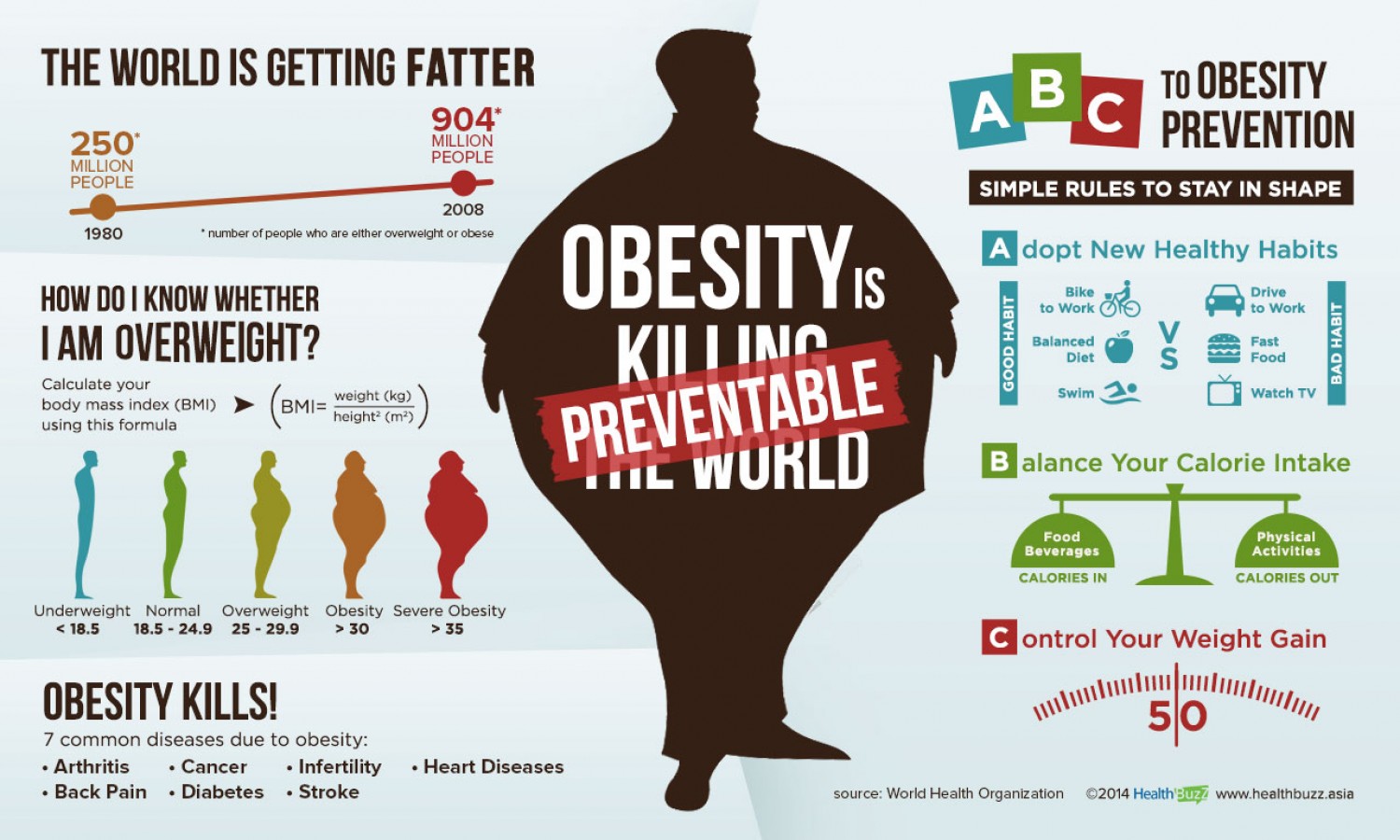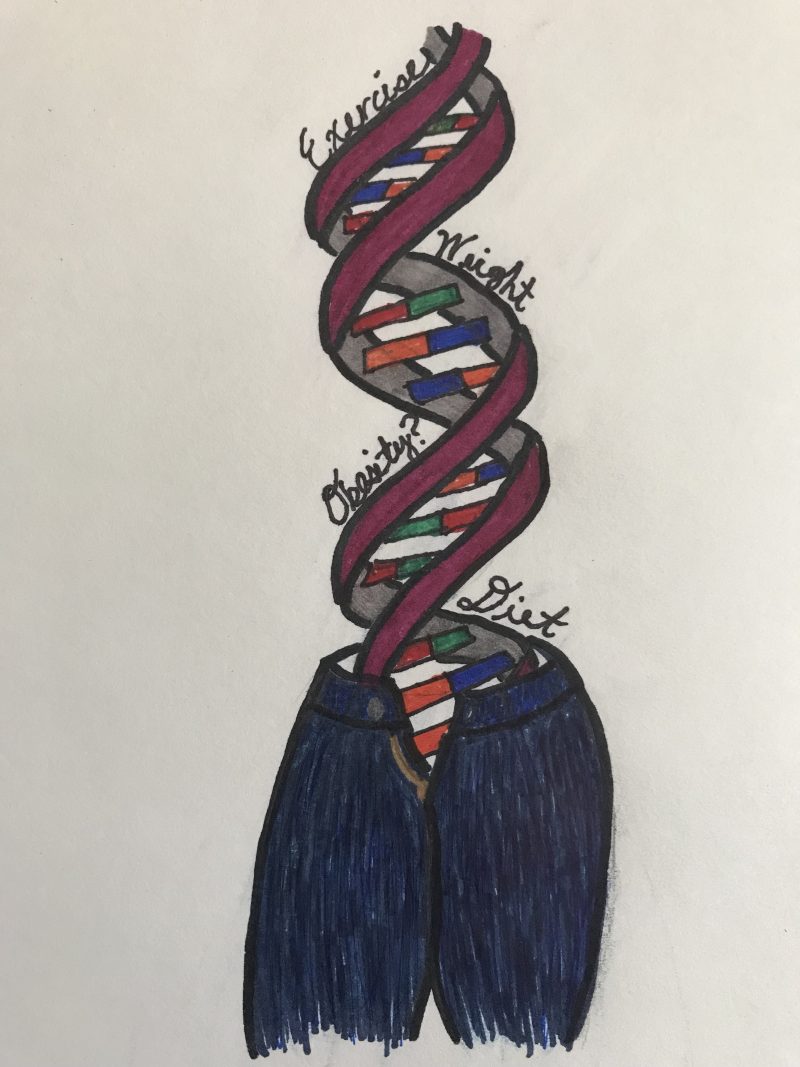In short the answer is maybe, it depends on who you are. What do your genes look like? Could your genes be making your jeans too small? As stated earlier, it depends on a number of factors. There are genes that predispose someone to weight issues, while there are other genes that are direct links and considered for genetic obesity.
Obesity
Obesity is not just being overweight, that is but one small piece of it. As you go about your day your body releases certain neurotransmitters that are responsible for sending signals to either spend energy or take in energy via food. This balance can be disrupted by a number of things such as overeating, food addiction, lack of exercise to deplete energy, dietary habits, insulin, medications, etc. Everyone’s heard the spiel of eating right and exercising to maintain a healthy life. Well we need to start doing it sooner than later.
According to the CDC “the prevalence of obesity was 39.8% and affected about 93.3 million of US adults in 2015~2016.” This is in part due to fast food and easy prepared food with a lot of crap in it. Fast food and prepackaged food sales are on the rise as laziness and time commitments take over society. This food contains many saturated fats which are one of the biggest inputs into obesity. The picture below simply highlights obesity, ways to prevent it and why you don’t want it. 
The Obesity Epidemic – Childhood
The percent of obese children and teens has tripled since the 1970s, increasing to the point where in 2016 it was reported that 1 in 5 children were obese. So what is going on with these kids? A lot of it has to do with lack of physical exercise within the world today as children turn more to screens and less to playing outside. Its not just home life either, schools have been reducing gym classes to the point where now less that 25% of high school students take gym classes daily.
Genetic Obesity
There are genes that influence your ability to gain and lose weight depending on how they function in addition to their expression. Certain genes may make you more predisposed to having weight issues. Your family matters too though, in addition to your genetics they pass teach specific behaviors regarding food and exercise. Depending on your family’s lifestyle this can be problematic, especially as a child because they aren’t in control.
So what about the kids that are obese from the start? The ones that no matter how hard they try throughout their life they will never lose weight? These children have a genetic obesity. There are 5 major forms of genetic obesity, proopiomelanocortin (POMC) deficiency, leptin receptor (LEPR) deficiency, Bardet-Biedl syndrome, Alström syndrome, and Prader-Willi syndrome. One thing to note is each of these conditions produces a baby with a healthy weight at birth and the baby will become severely obese over the next few months. Each of these has their own symptoms and unique attributes like the polydactyly of Bardet-Biedl.
Prader-Willi Syndrome is the most common genetic cause of obesity to date with 1 in 12,000-15,000 people diagnosed, it is also the most common diagnosed at genetic facilities. There are 3 different ways one can obtain Prader-Willi genetically and they all involve a region on chromosome 15. Chromosome 15 is responsible for making small nuclear RNAs that regulate other RNA molecules. Also in chromosome 15, the maternal copy is inactive and thus all gene expression comes from the paternal copy. 70% of cases have a segment of the parental chromosome deleted, this leads to completely lacking certain genes. 25% of cases have two maternal copies and zero paternal. The rarest of them have a translocation or mutation/ defect that abnormally inactivates the genes on the paternal chromosome.
A Documentary on the Lives of those with Prader-Willi Syndrome
Alström Syndrome is an autosomal recessive condition caused by a mutation in the ALMS1 gene that encodes for an abnormally short and nonfunctional ALMS1 protein. These proteins are implicated in ciliary function, cell cycle control, and intracellular transport.
Bardet-Biedl Syndrome is a condition caused by a mutation in one of 14 different genes. These genes all play a role in cilia function and structure. When mutated these are not right and it disrupts signaling pathways during development which leads to abnormalities in sensory perception.
Leptin Receptor (LEPR) Deficiency is an autosomal recessive condition caused by mutations in the LEPR gene preventing the leptin-receptor from responding to leptin. This doesn’t allow the leptin to trigger a “full” feeling so the individual is always hungry.
Proopiomelanocortin (POMC) Deficiency is an autosomal recessive condition that is extremely rare, only about 50 documented cases in literature. It is caused by mutations in the POMC gene leading to an abnormally short protein or none at all. This protein naturally gets spliced into multiple pieces, or peptides, which each work in their own fashion. When this is incorrect you have lowered levels of ACTH which reduces cortisol production leading to adrenal insufficiency and hypoglycemia which can lead into even more problems. With lowered α- and β-MSH the body’s energy balance is dysregulated leading to overeating and severe obesity.
